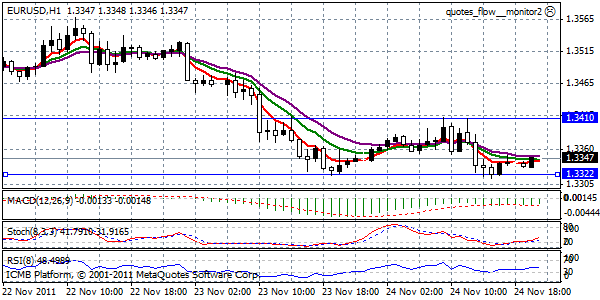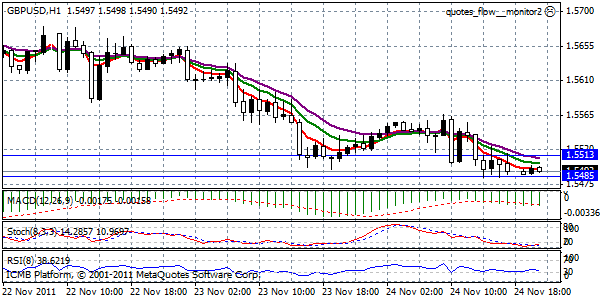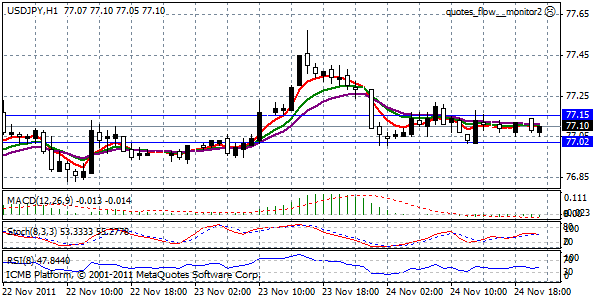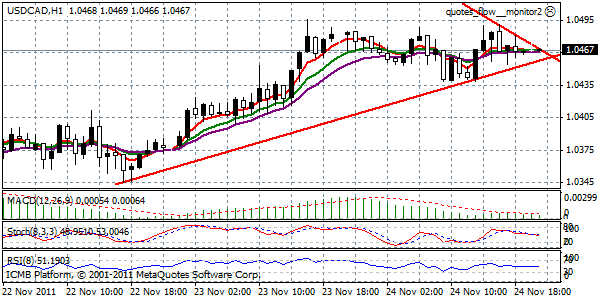Stocks fell, Italian bonds declined and the cost of insuring European government debt against default rose to a record after German Chancellor Angela Merkel ruled out joint euro-area borrowing. The MSCI All-Country World Index retreated 0.3 percent at 2:21 p.m. in New York. The yield on Italy’s 10-year bonds climbed above 7.1 percent. The Markit iTraxx SovX Western Europe Index of credit-default swaps on 15 governments rose three basis points to 381. The Stoxx Europe 600 Index fell 0.2 percent and Standard & Poor’s 500 Index futures slid 1.4 percent. U.S. markets are closed today for Thanksgiving. The euro was little changed against the dollar at $1.3338.Euro bonds are “not needed and not appropriate,” Merkel said at a press conference with Italian Prime Minister Mario Monti and French President Nicolas Sarkozy in Strasbourg,France. More than $4 trillion has been erased from the value of equities worldwide this month as rising borrowing costs in the euro-area stoked concern the debt crisis will derail growth. “The market sees a ‘no’ and reacts to it,” said Martin Huefner, chief economist at Assenagon GmbH in Munich, which manages more than $4.7 billion of client assets. “We’re going to see a deterioration of equity markets in the coming months to the point where something will have to be done. The market would be euphoric to get euro bonds. Apparently the pressure is not big enough yet.” The euro weakened 0.3 percent against the yen and 0.1 percent versus the Swiss franc. The yen advanced against all but two of its 16 major counterparts.

U.K. economic growth accelerated in the third quarter as stock building and government spending offset weak consumer spending and business investment Gross domestic product rose 0.5 percent from the previous quarter, when it increased 0.1 percent, the Office for National Statistics said today in London. The figure matched a previous estimate and the median forecast in a Bloomberg News survey of 32 economists. Consumer spending was flat on the quarter, while investment fell 0.2 percent. Underlying growth “is weak,” the office said. The Bank of England, which has restarted bond purchases to aid the recovery, said yesterday that underlying growth was probably weaker than the reported figure due to “heightened uncertainty” related to the euro-area crisis. The bank slashed its 2012 growth forecast by more than half and policy makers have signaled more stimuli may be needed in future. “We don’t see any significant improvement or a change in conditions coming soon,” said Ross Walker, an economist at Royal Bank of Scotland Group Plc in London. “There will be a pickup in growth as 2012 progresses, but next year will feel very similar. But there’s no alternative. We’re in no position to engage in fiscal stimulus.”From a year earlier, the economy grew 0.5 percent, the statistics office said. Growth in the second quarter partly represented a rebound from disruptions in the previous three months caused by March’s earthquake in Japan and an extra public holiday to mark the wedding of Prince William and Kate Middleton on April 29.

Currency-swap spreads are offering the biggest discount on yen loans in at least 14 years, supporting demand for Japan’s bonds even as Standard & Poor’s and the International Monetary Fund warn of its debt load. The interest rate on a two-year basis swap to exchange dollars for yen has fallen to 0.85 percentage point below the three-month London interbank offered rate for Japan’s currency, the lowest since at least June 1997, Bloomberg data show. Japan’s two-year debt, which has the second-lowest yields among developed markets, offers higher rates than equivalents in the U.S., U.K. and Germany for investors who use the swaps. Yen funding has become relatively cheaper as concern about the outlook for the euro union spurred a rush for dollars, driving Libor in the U.S. currency to 0.51 percent, the most since July 2010. Demand for a haven prompted overseas investors to buy the Asian nation’s debt at the fastest pace in four years. Even so, mounting fiscal strains prompted the IMF and S&P this week to say Japan’s borrowing costs may surge.“The negative yen basis swaps allow dollar holders to get yen funding cheaply,” said Makoto Noji, a senior debt and currency strategist in Tokyo at SMBC Nikko Securities Inc., a unit of Japan’s second-biggest banking group by market value.“Investors holding dollars can use the basis swaps to buy yen assets, such as two-year government bonds.”

Canadian average weekly earnings rose at the slowest pace in almost two years in September, government figures showed. The paychecks of non-farm payroll employees rose 1.1 percent from a year earlier, the least since October 2009, according to Ottawa-based Statistics Canada. The average workweek was little changed at 33 hours in that period. Wages have trailed inflation partly because labor productivity growth has been poor over the last few years, Bank of Canada Governor Mark Carney told reporters yesterday in Montreal. The central bank estimated last month the economy’s potential can grow by just 2 percent, based on increases in labor input and productivity. Wages in Ontario, Canada’s most populous province, fell 1.3 percent in September from a year ago, Statistics Canada said today. The number of employees on payrolls rose by 47,900 in September from August to 15.1 million, a gain of 0.3 percent, Statistics Canada said. The increase from a year ago was 1.8 percent. The agency’s main employment report, the labor force survey of households, reported a job gain of 60,900 in September and a loss of 54,000 in October. It also reported year-over-year inflation rates of 3.2 percent for September and 2.9 percent for October.

